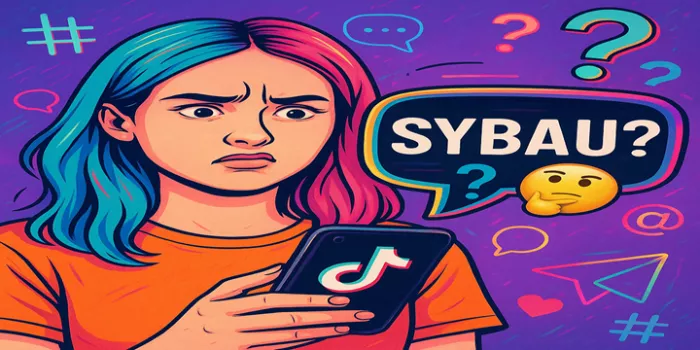
In the digital age, language evolves faster than trends on TikTok. One moment you’re decoding “rizz,” and the next, you’re hit with SYBAU—a term plastered across videos, memes, and comment threads. But what does SYBAU mean, why is it trending, and should you even be using it?
If you’re looking for a complete, unbiased deep dive into SYBAU, this is it—no fluff, just facts, culture, and context.
Let’s begin by unwrapping the viral slang itself and uncovering what it really stands for.
What Does SYBAU Mean? Breaking Down the Slang
SYBAU stands for "Shut Your B** A** Up."** It’s a blunt and confrontational phrase often used to silence someone during an argument or online roast. TikTok users adopted this term as part of their slang arsenal to mock, dismiss, or exaggerate a moment of fake outrage.
According to KnowYourMeme, the term resurfaced in 2023 and gained momentum thanks to a comedic TikTok that exaggerated toxic online behavior.
The acronym format allows users to bypass automatic filters and content moderation tools, making it both viral and controversial.
Now that we know what it means, let’s explore how this slang became a TikTok phenomenon.
SYBAU on TikTok: How It Went from Joke to Viral Catchphrase
SYBAU exploded in popularity on TikTok in late 2023, driven by humorous and highly exaggerated skits. Creators like @brianbeepboop injected the acronym into comedic bits, generating millions of views and thousands of stitched responses.
As reported by MSN, SYBAU began appearing in video subtitles, comment roasts, and fake debates mimicking real-life feuds.
Its viral rise illustrates how Gen Z slang doesn’t just spread—it morphs into cultural shorthand. TikTok wasn’t just a platform—it was the launchpad.
But viral fame also comes with questions about tone and intent. That leads us to the next important piece—its usage context.
SYBAU in Real Conversations: Harmful Insult or Harmless Meme?
Let’s get something straight—SYBAU is vulgar and offensive in literal form. However, TikTok’s satirical tone often blurs the line between insult and irony.
According to Indy100, the term is frequently used in jest but still carries aggressive undertones that can be harmful depending on context.
For some, it’s just a punchline in a meme. For others, it’s abrasive and unnecessary. Tone, audience, and intent determine how SYBAU is received, making it both socially charged and heavily contextual.
Understanding its dual role—comedic tool or digital dagger—helps us dive deeper into the cultural psychology behind its use.
Why Is Gen Z Obsessed with SYBAU? The Psychology of Meme Slang
So why does slang like SYBAU resonate so deeply with younger users?
Here’s why SYBAU works:
- Acronym Format: Quick to type, even quicker to react to
- Mock Drama: Used in fake fights and parody content
- Irony-Fueled: Said with a wink, not a fist
- Bypass Filters: Acronyms avoid bans on harsh language
- High Engagement: Triggers responses and stitches
Reddit communities like r/197 reveal that many Gen Z users view the term as performative drama, not genuine hostility.
What we’re seeing is less about offense and more about hyper-ironic self-expression—a core trait of Gen Z's communication style.
Naturally, this trend raises flags about where platforms draw the line between creativity and toxicity.
How Platforms Handle SYBAU: Content Moderation & Language Loopholes
SYBAU is a case study in how slang adapts to platform rules.
Most platforms ban explicit phrases, but acronyms? Not so easily. That’s why SYBAU flies under the radar until it's widely recognized.
This cat-and-mouse dynamic illustrates a larger trend in social media: the evolution of slang as a rebellion against algorithmic suppression.
That very adaptability is why terms like SYBAU might disappear, but the pattern they represent will persist.
Will SYBAU Last? Or Is It Just Another Internet Fad?
The lifecycle of slang like SYBAU is usually short-lived. It peaks, gets memed to death, and then fades—often within months.
However, its lasting impact lies in the format, not the phrase:
- Acronyms that feel rebellious
- Humor veiled in hostility
- Language as entertainment
From GYAT to PMO and Rizz, TikTok is full of terms that explode and then vanish—SYBAU is simply the next in line.
So while SYBAU may fade, its role in shaping the next viral acronym is already set.
To see how it compares, here’s a breakdown of TikTok slang terms and their characteristics.
TikTok Slang Showdown: SYBAU vs Other Viral Acronyms
| Term | Full Form | Usage Context | Viral Platform | Vulgarity Level | Trend Longevity |
| RIZZ | Charisma or Flirtation Skill | Dating/compliments | TikTok/YouTube | None | High |
| PMO | Put Me On | Asking for plugs/info | TikTok | None | Medium |
| ICL | I Can’t Lie | Honest opinions | TikTok | None | High |
| GYAT | Curvy body compliment | Reaction/admiration | TikTok | Mild/Contextual | Medium |
Each one reflects a specific emotion or social cue, packaged in an acronym-friendly format, but SYBAU stands out for its controversy.
Should You Use SYBAU?
Here’s the bottom line: probably not in serious contexts. SYBAU might be trendy, but it's abrasive and offensive in most real-life conversations.
If you’re a creator or commenter:
- Use it sparingly and contextually
- Always consider your audience
- Prefer satire over shock for long-term engagement
There are funnier, cleaner alternatives that are still trending.
Conclusion: SYBAU Is a Mirror of Meme Culture
SYBAU isn’t just a TikTok slang—it’s a cultural snapshot. It tells us how language is evolving, how humor walks a tightrope with offense, and how acronyms can bypass both algorithms and decency.
Use it if you must—but know what you’re really saying.
FAQs
Q1: Is SYBAU banned on TikTok?
No, but it could be flagged if used aggressively or repeatedly.
Q2: Can SYBAU be used humorously?
Yes—but with care. It’s often used ironically in TikTok skits, not real fights.
Q3: What are cleaner alternatives to SYBAU?
Try “Be for real,” “Next,” or “Bruh.” Still funny, far less offensive.
Q4: Is SYBAU part of Gen Z culture?
Yes. It reflects Gen Z's love for short, punchy, ironic language.





Comments